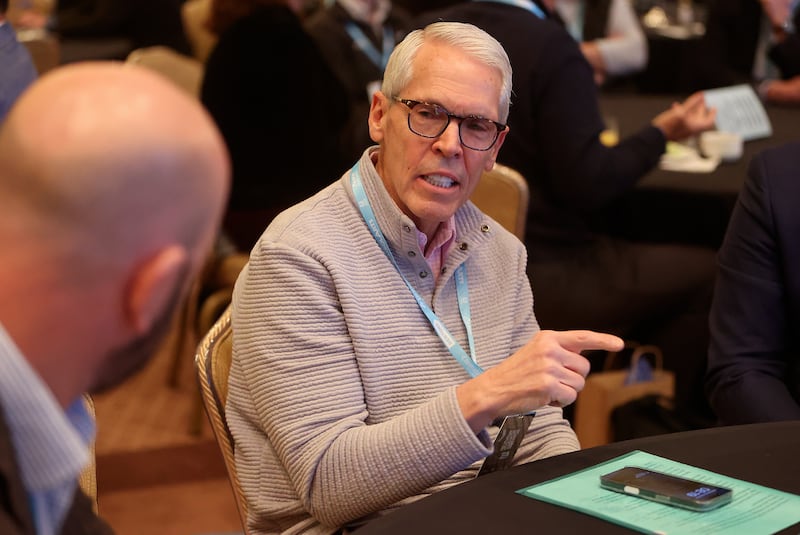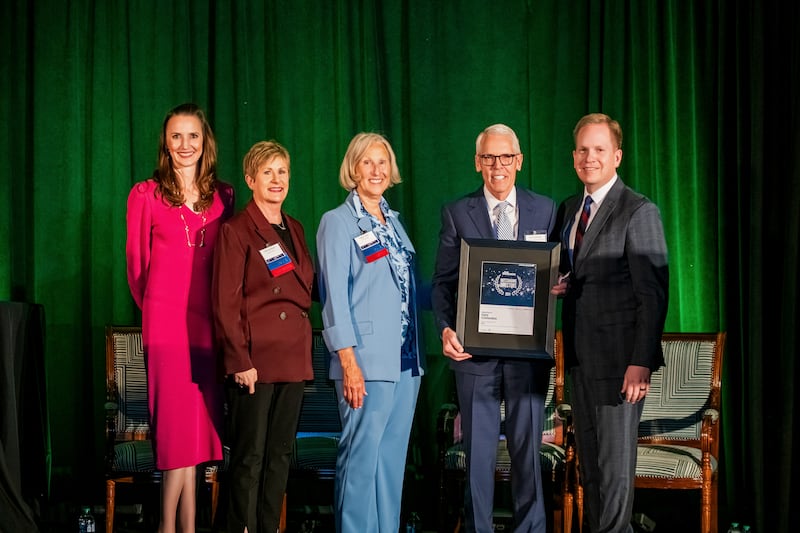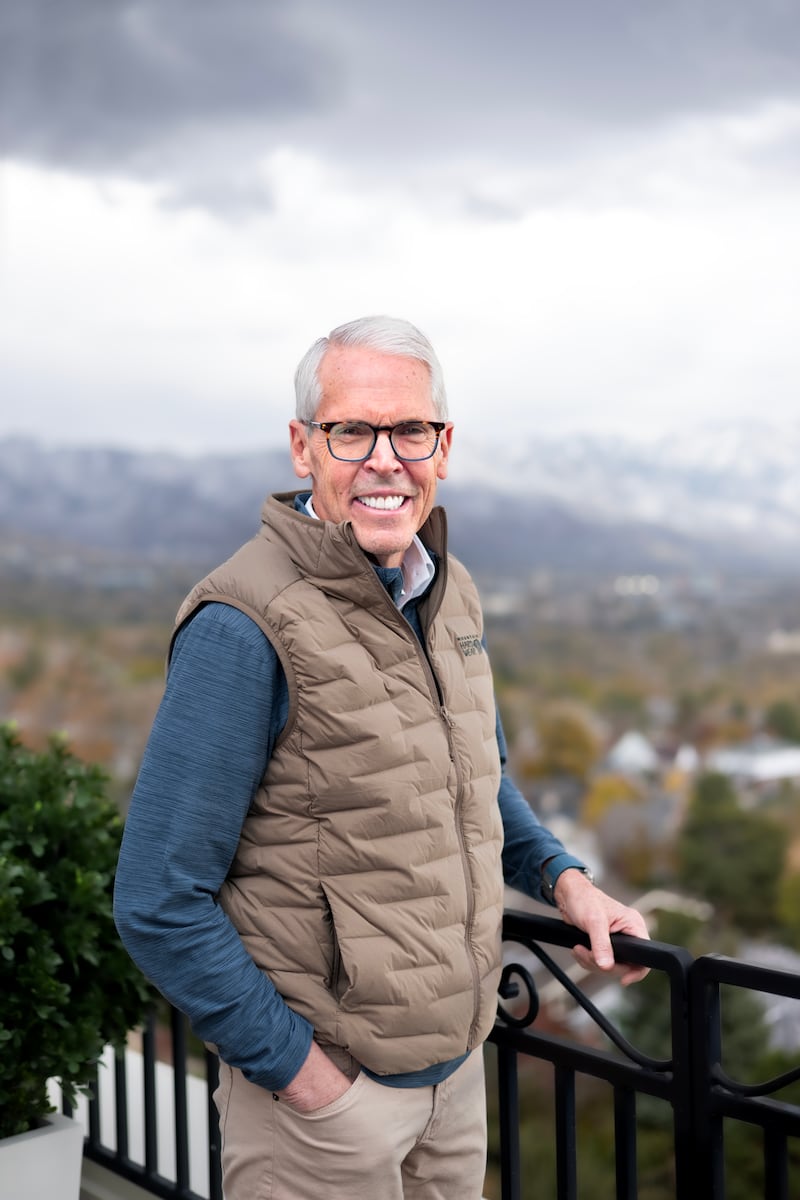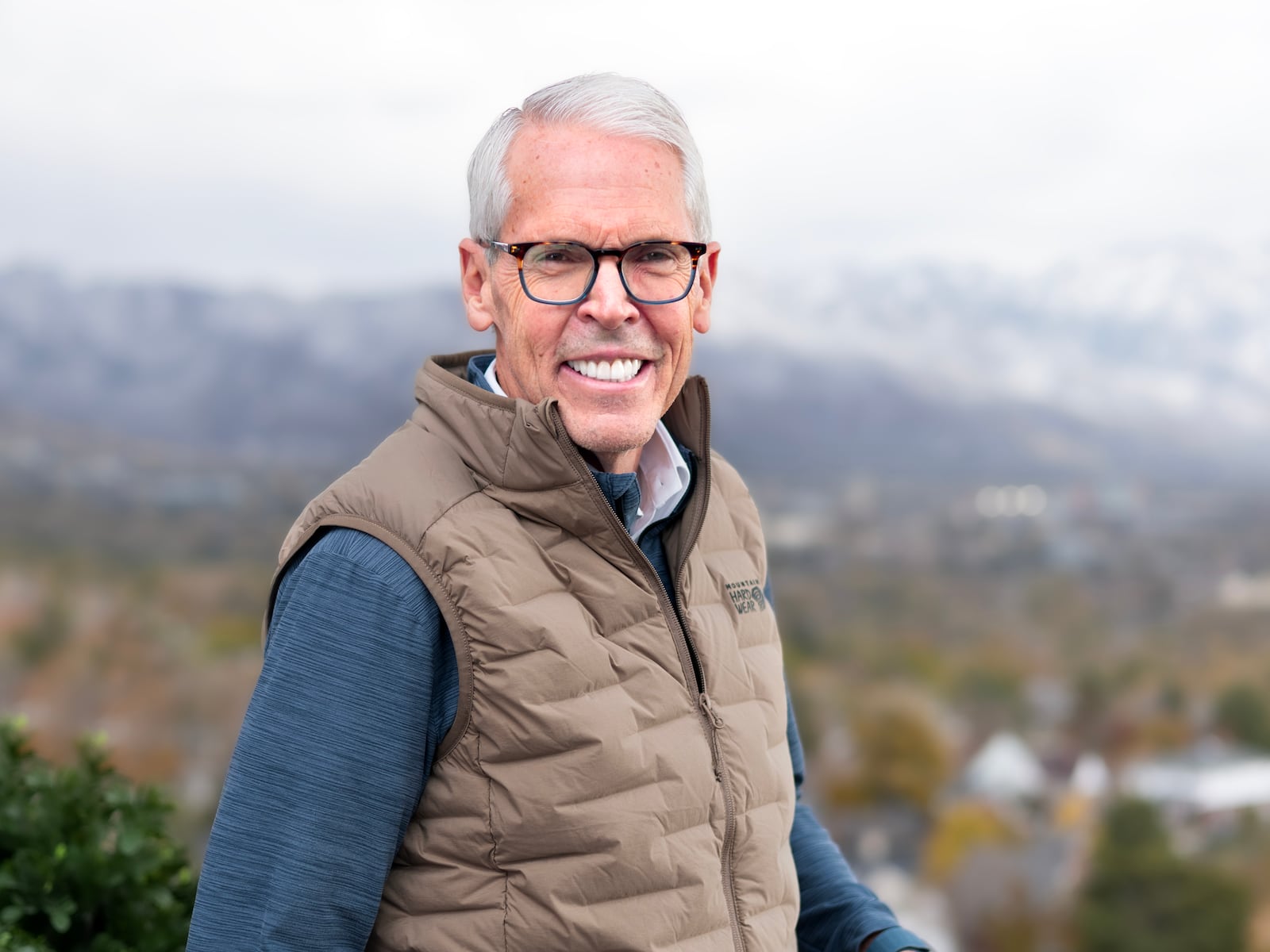This story appears in the December issue of Utah Business. Subscribe.
On this day in the 1950s, the elementary school boy watches his mother walk around the counter of his family’s paint and glass store. There is a big, clunky machine on the dark brown wooden desk where she sits. She picks up a stack of heavy yellow sheets of paper and drops one end against the desk, then another, to even their sides and corners. She then takes one from the top of the pile.
She places the piece of paper into the machine, which is about three-and-a-half feet wide and four feet tall. Ruth Crittenden picks up an invoice and types in an amount. Just like a typewriter, the keys smack a ribbon that inks the paper with the numbers she presses.
Now that she’s begun, there is no stopping. Ruth is a mother of three, but she’s also the bookkeeper for Crittenden Paint and Glass, and she has to close out the general ledger for the month. The machine requires the task be done in one sitting. It’s midday now. The task is large. She will work through the night.
The schoolboy, Ruth’s son Gary Crittenden, would watch his mother close out the books month after month, year after year. The paint store was a place for fun. There was a chute that ran from the second floor, where his dad stored cans of paint, to the first floor. When he and his older brother and sister were little, they used it as a slide.
The store was also a place for work. As an older boy, Gary caught the cans at the bottom of the chute and restocked and straightened the shelves so they were presentable. He dumped sawdust in the aisles and swept it up to clean the floors. As a teen, he delivered paint to customers.
“My mom was tough, disciplined and an amazingly hard worker,” Gary says today.
But he already knew that from the way she parented and how she cleaned their home. When someone wiped their hands on a towel after using the bathroom, Ruth swooped in behind them and replaced the towel.
It was what he learned in the paint and glass store — where he saw his mom sit down and start an all-nighter each month — and what he learned when he saw her arrive back home at 6 or 7 in the morning, exhausted, that sank deep into his bones. Some of that might have been in his DNA, waiting to be switched on. But was Ruth aware of what it was that she was handing down to her boy as she sat at that brown desk, precisely feeding thousands of numbers into a monster of a machine that regurgitated them on yellow paper?

Life lessons from a Utah-raised international CEO
Business people will be impressed to learn that Gary left that paint store in Ogden, Utah, for Brigham Young University and Harvard. That he went on to add jet fuel to the national expansion of CVS. That he rose to become the CFO of American Express, where he was working on the 51st-floor office of the World Financial Center and watching out a window when the first plane hit the north tower of the World Trade Center on Sept. 11.
But not everyone can relate easily to being the CFO of American Express and Citigroup or the CEO of HGGC, where Gary worked in venture capital alongside Hall of Fame quarterback Steve Young.
Everyone can connect with wrestling to develop self-discipline. Most endeavor to discover what is most important to them. Many strive to excel. Gary’s own cultivated discipline, instilled by his mother and developed across a remarkable business career, is woven throughout his story.
Close business relationships really do matter
“Always be a friend because you never know where your friends end up,” Gary says.
His first job out of Harvard was at Bain & Company in Boston, where he shared a cubicle with Ken Chenault. They commiserated daily on how hard they had to work and became fast friends. Gary spent 12 years at Bain, where he also befriended Mitt Romney and David Checketts, then left to be CFO of Filene’s Basement, a Boston icon he helped take public. Gary quickly developed a reputation for clear-eyed feedback and data-informed solutions that helped major corporations focus in ways that brought success.
One perfect example is the magic he performed for the parent company of today’s drugstore giant, CVS. He left Filene’s for the Melville Corporation, which owned CVS, the department store chain Marshalls and former retail giant Thom McAn Shoes.
“They were under some pressure from Wall Street,” Gary says. “It was a big company, and they called me up and asked me if I would come help them sort that out. That started me down a pathway that became the cornerstone of my career, which is figuring out how to restructure the components of a company to maximize the value of the enterprise.”
Gary realized that Melville CEO Stanley Goldstein had opened the first CVS and was surrounded by drugstore experts. In 18 months, Gary led a revolution. The company sold off Tom McAn and Foot Action and took both Linens ‘n Things and Wilsons Leather public. The massive reorganization saw Melville rename itself CVS Corp. after its remaining business. The market loved it, and Gary was tapped to repeat his core skill over and over again.
After a stint as CFO of Sears, he went to Monsanto, the agricultural giant. He spun off the company’s pharmaceutical business, which made no sense under the same roof.
“There are many, many, many things that are urgent but not important. There are few things that are really important but not very urgent.”
— Gary Crittenden
Chenault was watching. He called Gary as he was about to become the CEO of American Express and said he wanted Gary to move to Wall Street as CFO. Together, they ran the same playbook. With the help of their teams, they made the credit card business the core of American Express and split off a large division that sold life insurance and mutual funds, creating Ameriprise Financial in 2005.
“In our cubicle at Bain, we never had any idea that we would have any significant responsibility in our lives, but that friendship ended up being critical to having an opportunity to work with him,” Gary says of Chenault. “It pays to always be a friend.”
Those successes led Gary to the CFO job at Citigroup, one of the “Big Four” American banking institutions.
“Gary is the finest person I know. He is full of integrity. He is full of love. He is full of goodness,” says Elder Robert C. “Bob” Gay, an emeritus general authority of The Church of Jesus Christ of Latter-day Saints who met Gary when they were Harvard students, worked with him at Bain and chose Gary to succeed him as CEO of HGGC. Though both are ostensibly retired, they continue to serve at HGGC as special executive directors for specific venture capital funds.
Don’t confuse the urgent with the important
As a young executive at Bain, Gary says he enjoyed the meals portion of his expense account so much that he gained 50 pounds traveling the country to work with clients. In a performance review that is unthinkable today, a leader told Gary to lose the weight. He decided to try running around the block each day for a week, but it was painful. Out of shape, he immediately developed shin splints. He read that it was better to run longer distances than shorter, so when he resumed, he ran for 20 minutes one day, 22 the next and 24 the day after. He lost the weight and kept it off.
Today, 45 years later, he still runs three miles each weekday and six-to-10 miles on Saturday.
“Running is one of my vices,” he says. He has also called it a romance.
For Gay, running is one of the clearest examples of Gary’s discipline. When they both worked on Wall Street and lived in New Canaan, Connecticut, Gay woke at 4 a.m. every day to run before starting the long commute into New York City, a daily round trip of three-and-a-half hours.
That time commitment led to his learning an important life lesson: the Stephen Covey mantra to put first things first.
“Don’t confuse the urgent with the important,” Gary says. “There are many, many, many things that are urgent but not important. There are few things that are really important but not very urgent. That’s true about almost everything in life, from my experience. If you can figure out how to spend your time on the important things and only deal with the urgent things that happen to be important, it’s likely to be a good outcome.”

Modernizing a global operation
Hours after Gary’s retirement party, leaders from The Church of Jesus Christ of Latter-day Saints asked him to become the managing director of the Missionary Department, a CFO-style role that included overseeing a fleet of 19,000 vehicles, finances and apartments around the world.
“Gary’s a church treasure,” says Elder Brent H. Nielson, who was in charge of the ecclesiastical side as the executive director of the department at the time. He also calls Gary a genius.
The managing director is a paid position, but Gary refused his salary while working long hours, Nielson says. Under the guidance and at the urging of the members of the Quorum of the Twelve Apostles on the church’s missionary committee and under the direction of the First Presidency, he helped coordinate a review of the church’s missionary work.
“There was a willingness to start with a fresh sheet of paper about how to create the opportunity to have missionaries sit across the kitchen table to give an invitation to a person,” Gary says.
During his three-year stint in the Missionary Department from 2016-19 — and building on the work of past leaders — Gary was part of efforts that led to increased search engine optimization for church websites, the move from door-to-door contacting to social media contacting through smartphones, updates to the missionary manual and handbook, improved safety training, and policy changes that included allowing missionaries to call home weekly and new dress standards that included pants for women.
“He moved missionary work ahead 20 years in three years,” Nielson says. “The way we do missionary work is totally different than it was in 2016. Everything you see that’s happening now started during his three years there.”
Five weekly questions to live by
“As I went through my career, [I observed] people who had been successful at their career — done really, really well — but had not ended up doing the thing that actually was most important to them in their life,” Gary says. “The sad thing was, they got what they worked for, but it wasn’t what they intended.”
Some examples were heart-wrenching, he says. A major takeaway Gary wishes to impart, then, is this: “Determining the important things requires time.”
Years ago, Gary began to set aside time every Sunday night to review what he determined were the five most important things in his life:
- That he work hard to become a disciple of Christ.
- That he be a great husband.
- That he be a great father.
- That he be a great son.
- That he be a friend to his friends.
“That says easy, but it does really hard,” he admits. “Every Sunday night for 35 years, I’ve said to myself, ‘What do I need to do so that this person will know they’re the most important thing in my life?’ I plan that into my calendar just like I plan the regular appointments that I have. If you ask yourself, ‘What would be most important to my three kids this week so that they know that their dad loves them and that they’re the most important?’ you can answer that question.”



